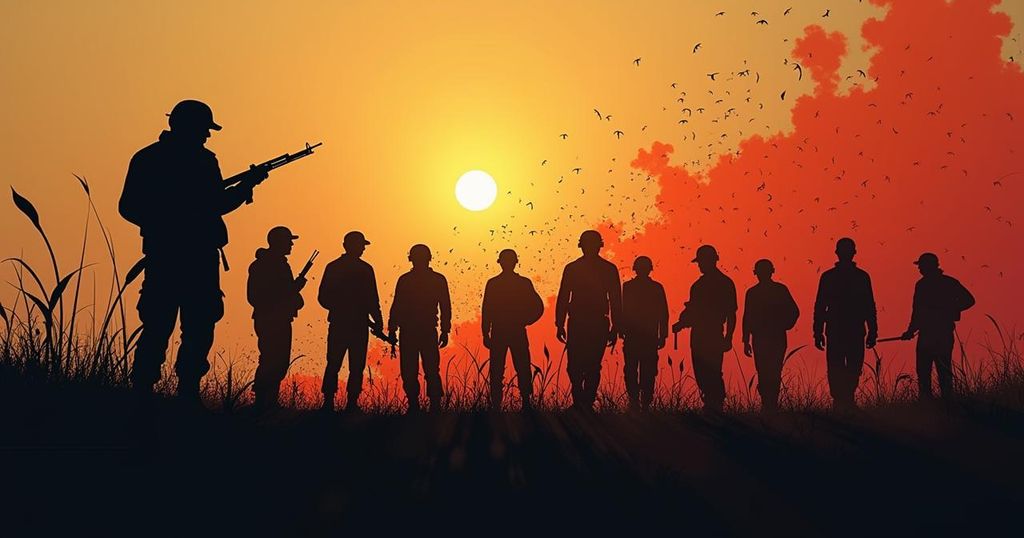Does the Wagner Group Rebellion Signal a Russian Defeat in the Ukraine Conflict?
The Wagner Group, led by Yevgeny Prigozhin, has launched an armed rebellion against Russian military leadership, claiming to have captured army installations and suffered from a lack of ammunition. This revolt raises questions about the future of Russian military operations in Ukraine, particularly in light of the group’s significant contributions in battles like Bakhmut. Analysts suggest that withdrawal of Wagner forces could halt Russian offensives, thereby undermining President Putin’s military strategy.
The Wagner Group, renowned for its mercenary activities, has instigated an armed rebellion aimed at Russian military establishments, as accusations emerge that the military has been attacking its forces. This revolt, led by the group’s chief Yevgeny Prigozhin—once an ally of President Vladimir Putin—has ignited significant turmoil within Russia, coinciding with a Ukrainian counteroffensive and escalating tensions with the West, raising concerns of a possible civil war. This insurrection from the Wagner Group is not a spontaneous event but has been building for some time. Recently, Defense Minister Sergei Shoigu, backed by Putin, mandated that all mercenaries sign contracts with the Ministry of Defence, a directive that posed considerable challenges for Prigozhin’s ambitions for autonomy and influence. Following his refusal to comply with this demand, Prigozhin accused the Ministry of Defence of reducing ammunition supplies for his troops during critical operations, particularly in Bakhmut. He further alleged missile attacks on Wagner facilities, stating, “These are someone’s fathers and someone’s sons,” while referencing unidentified casualties and expressing deep frustration over the lack of support. Despite facing significantly greater enemy resources, Prigozhin asserted, “Wagner ran out of resources to advance in early April, but we’re advancing despite the enemy’s resources outnumbering ours fivefold. Because of the lack of ammunition, our losses are growing exponentially every day.” This ongoing conflict has led Prigozhin to threaten a withdrawal of his forces from Bakhmut, a battleground they have fiercely contested for over 200 days, as the situation develops with no apparent resolution in sight. As the Wagner Group mounts its counter-offensive against the Russian defense leadership, analysts speculate on the implications of this rebellion for Russia’s military engagements in Ukraine. The Wagner forces have been instrumental in securing key areas, particularly in Bakhmut, raising questions about the viability of continued Russian offensives should these mercenaries withdraw. Yohann Michel, a research analyst at the International Institute for Strategic Studies, commented, “If he’s removed from the front line — except if Russia surprisingly has reserves that they did not want to use before — I think we can say it is the end of this phase of the offensive for Russia.” Concerns regarding the potential chaos due to Prigozhin’s removal have also been voiced by a U.S. official, who noted, “There is nobody as effective as him.” As developments unfold, Wagner mercenaries have reportedly advanced towards Moscow, having occupied military headquarters in Rostov-on-Don, suggesting a significant escalation in their rebellion. Prigozhin has openly criticized President Putin, promising a shift in leadership within Russia, which further exacerbates the governmental instability as the conflict persists. Russia’s military landscape appears precarious, marked by internal dissent and the substantial operational role of the Wagner Group, casting doubt on the future trajectory of its military strategy in Ukraine.
The Wagner Group has emerged as a pivotal player in the conflict in Ukraine, primarily serving as a private military company that has engaged actively alongside Russian forces. With its operations stretching back to previous military engagements, the group’s recent rebellion reflects a culmination of longstanding tensions between its leadership and Russian military command. The encroachment into tactical military responsibilities further highlights the vulnerabilities within the current Russian military hierarchy, particularly against the backdrop of sustained Ukrainian resistance and international scrutiny.
In summary, the rebellion initiated by the Wagner Group is a significant development that poses serious implications for Russian military stability and its ongoing efforts in Ukraine. The potential withdrawal of Wagner forces from crucial fronts could signify the cessation of a key phase in Russia’s military strategy, embodying a complex interplay of internal power dynamics, operational efficacy, and broader geopolitical consequences. The ramifications extend beyond the battlefield, suggesting an imminent challenge to Putin’s authority and coherence within the Russian military establishment.
Original Source: www.livemint.com




Post Comment